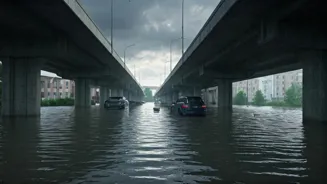Floods, Delhi's Recurring Problem
Delhi's susceptibility to flooding during the monsoon season is an ongoing concern. The city's drainage systems often prove inadequate to handle heavy
rainfall, leading to widespread waterlogging in various areas. This recurrent problem disrupts daily life for residents, causes traffic snarls, and poses health risks due to stagnant water. The recent floods served as a reminder of the pressing need for effective infrastructure and better urban planning, especially given that the issue reoccurs every year during monsoon season. It highlights the critical need for comprehensive and long-term solutions rather than ad-hoc responses.
Unused Funds: The Core Issue
A significant part of the problem revolves around the unspent funds allocated for drain repairs. According to reports, a sum of Rs 150 crore, meant for improving the drainage systems, remained unutilized until August 31. This raises serious questions regarding the efficiency of fund management and the prioritization of infrastructure projects. The failure to utilize these funds could be attributed to various factors, including bureaucratic delays, lack of planning, or issues with project implementation. Whatever the reasons, the consequence remains: inadequate drainage systems, exacerbated flooding, and the resulting difficulties for the city's population. The lack of funds for drainage repairs contributed heavily to the recent flooding.
Consequences for Citizens
The impact of the floods is widespread and significant, directly affecting Delhi's citizens. Waterlogged streets disrupt traffic flow, delaying commutes and hindering access to essential services. Stagnant water can become a breeding ground for disease-carrying mosquitoes, creating health hazards. Residents also face the risk of property damage and inconvenience. The recurring nature of these floods underscores the urgent need for action to protect residents and minimize disruptions. Effective and efficient drainage infrastructure must be implemented to mitigate these impacts. Authorities are under pressure to ensure that essential services, like the proper disposal of waste, continue working.
Need for Improved Planning
Addressing Delhi's flooding problem calls for a multi-pronged approach, starting with improved urban planning. Effective strategies include upgrading existing drainage infrastructure, ensuring regular maintenance of the systems, and designing future projects with climate change considerations in mind. The city also needs to prioritize the timely and effective allocation of funds for infrastructure development, ensuring that projects are implemented according to schedule. Such proactive measures are essential to reduce the impact of flooding, safeguard citizens, and promote sustainable urban development for Delhi, providing long term and sustainable solutions.













